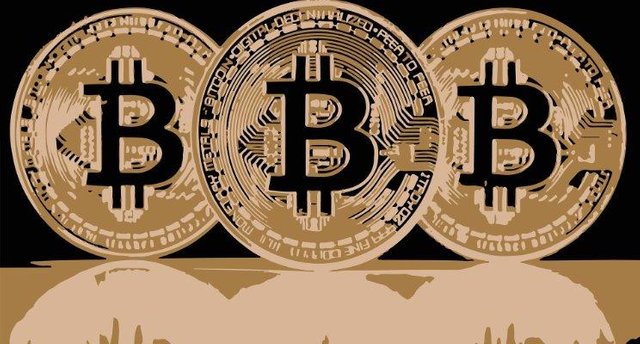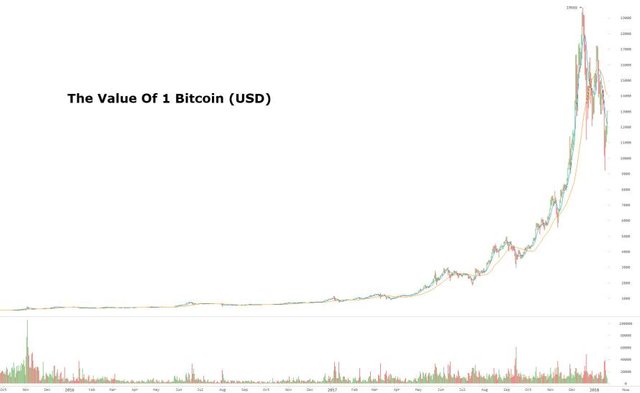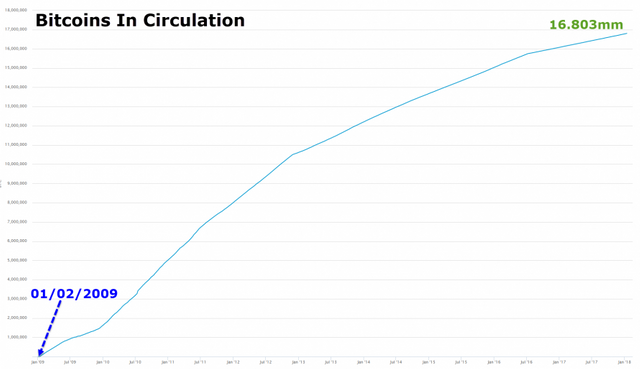Wharton Dean: Dimon Mindset Is Wrong, Cryptos Mean "The End Of Money As We've Known It"
Content adapted from this Zerohedge.com article : Source
Wharton Dean Geoffrey Garrett sees a big split in how blockchain-based digital cryptocurrencies like bitcoin are viewed on Wall Street versus in Silicon Valley. On the East Coast, the idea of a cryptocurrency replacing a fiat currency is still met with skepticism. But in the Valley, they seem "all in." In this opinion piece he offers his views on this corner of fintech._ 
I spent the first week of the New Year with a great group of Wharton undergraduates visiting many of our tremendous alumni in the San Francisco Bay Area. To say it felt very different from the East Coast is an understatement. And I am not talking about missing the "bomb cyclone," which we did.
I am talking about blockchain/bitcoin/cryptocurrencies, which are much more than a speculative Chinese-cum-millennial obsession.
Whereas most people on Wall Street remain skeptical, playing a wait-and-see game, Silicon Valley is all in. Literally every meeting I participated in, from the biggest tech companies to the smallest startups, was rich with enthusiastic and creative crypto conversations.
I used to think "fintech" meant the end of physical cash - replaced by mobile payments platforms owned by big multinational firms and currently led by China, in established currencies regulated by national governments and international agreements.
I now wonder whether the ultimate fusion of technology and finance will mean "the end of money," at least as we have known it for the last millennium. It's no longer sci-fi to imagine the replacement of dollars and other "fiat money" with open sourced, radically decentralized, deeply encrypted and self-regulating transactions in digital units of exchange that are "mined" rather issued by central banks.
A true fintech revolution.
I have to admit I went west very much in the Jamie Dimon mindset. The JPMorgan CEO and voice of Wall Street since the financial crisis famously dismissed bitcoin's virtual rise in 2017: "I could care less about bitcoin." Strip out his typically gruff rhetorical flourishes, and Dimon was making 2 fundamental points.
Dimon's first point was that "blockchain" — a globally distributed ledger of financial transactions made secure by advanced cryptography and competition among "miners" (computers competing to execute and record transactions, and being compensated for doing so) — has massive upside. But to become central to mainstream commerce, blockchain will have to lose its unregulated open source roots, be managed by a big multinational conglomerate (think some combination of Visa/Mastercard transactions and SWIFT international transfers), and fall under the clear jurisdictions of national governments and international agreements. >
His second point was that the transactions that blockchain records will ultimately be in "cryptodollars", or cryptoeuros, cryptoyuan, etc. — not bitcoin, ethereum, or any other "non-fiat," purely "digital" currency that is not issued by central banks. This is because there is literally no underlying value to a bitcoin ("worse than tulips," to use the oft-cited example of the Dutch "tulip bubble" in the 17th century). In contrast, there is underlying value to a dollar — guaranteed by the US Federal Reserve tied to the strength of the American economy.
The more I talked with people in the Valley, the less convinced I became of these two points.
This is very disconcerting to people like me, steeped in more than 200 years of macroeconomic thought. All the giants (Adam Smith, David Ricardo, John Maynard Keynes, Milton Friedman, Paul Samuelson, and others) not only assumed the centrality of currencies as we have known them. They also valorized money as literally the foundation of a well-functioning economy — both a unit of exchange and a store of value.
In Silicon Valley, there is a healthy disregard for all things Washington, government, and regulation - and of course for the status quo. It's no surprise there seem to be many more bitcoin believers on the West Coast.
**They ask powerful rhetorical questions. **
Don't governments and central banks always face the temptation of printing more money? Are you really so happy with the fees credit cards and banks charge? Wouldn't it reduce our worries about hacking and cyber security if financial transactions were better encrypted and recorded on millions of computers rather than a handful? Isn't the genius of bitcoin that there is a finite limit to how many can be produced (by the "halving" algorithm at the center of bitcoin mining)?
I tend to get lost as soon as the blockchain/bitcoin evangelists get into the real data science behind these technologies, but I do think there is real merit to their rhetorical questions. And I increasingly sense I am not alone.
Consider these simple facts.
We now can trade bitcoin futures on a crusty old financial exchange. There is lots of VC money pouring into crypto. Asset managers are starting to think about cryptocurrency indexes as a great diversification strategy, because bitcoin risk is likely uncorrelated with any "regular" economic risk. All are powerful indicators that the leading edge of "conventional" finance is taking very seriously the prospects for very radical financial innovation.

Finance meets technology, harnessing the combined power of Wall Street and Silicon Valley. Not only the end of cash, but also the end of money. That is the prospect and potential of fintech. What will happen and when it will happen is impossible to predict — as is invariably the case with the most radical innovations. But there is little doubt that an enormous amount of capital, energy and creativity will pour into cryptocurrencies in the coming months and years — even if bitcoin proves the biggest bubble since tulips.
* * *
Geoffrey Garrett is Dean, Reliance Professor of Management and Private Enterprise, and Professor of Management at the Wharton School of the University of Pennsylvania. Follow Geoff on Twitter.

thanks for posting
I appreciate your comments
I wouldn't be surprised if bitcoin hit 100k this year.
They also do not want to spend a currency that could rise 50% in hours, and likewise, no Sellers would like to accept a payment method that can be significantly reduced once received
Not like that bro ..that is depends up on the trading..if buyers invest more money in coins the price of the cryprocurencies will be increased ..if the selling is more compared to buying then price will be decreses .only based on the trading only price will be hiked or readuced..
@zer0hedge I don't think the heads of state will let this end.as many states have not expressed warmth to the president.it needs a little more time to get it.And legal regulations about crypto money should be introduced.without it crypto parables can not enter into force
I also think so.
@zer0hedge...bro Crypto futures are just online investment and some of gambling. Not all coins but only some coins ..we already saw a bitconnect..present in market day by day lot of new coins came.. I think that message is pretty clear. But people going long could be siphoning capital away from actual Crypto purchases.The issue is that as BTC tries to survive, the cost of using BTC goes up which lowers it's value. Lower value reduces demand and value falls. BTC is consuming itself: operating cost going up while value is going down. No way to stop the cycle. Crypto 2.0 might solve the problem, I don't pay attention, but BTC can't escape.Crypto and Gold follow the same principle.If Gold was not diluted by the quantity of paper gold, its price would be north of the current price. People will not buy gold if they receive the paper gold. They want physical gold.You can not dilute the total of BTC. It's about 20 Millions BTC coins. It will stay that way; thus, the price will go up. Thank you for sharing info with us ...
Why would buying futures be gambling ? Also I think people fully realize that BTC wont be able to compete as the "digital currency", there a lot better and faster coins (like Steem), people buy BTC because it has the first mover advantage and has proven to be areliable source of value.
Also even with 15-30$ fees BTC is a lot cheaper than most international transactions.
Not all coins bro..present in market day by day lot of new coins will come and already came...only few of them are trusted like top coins in a market like bitcoin and ethurium so and soo..we already saw a bitconnect closes trading..i said based on that only..i am also trusted and want to invest in some cryptos
It would be a good investment to invest in top coins, 3.0 blockchain, scalable and fast - that is the future.
Yeah yes bro..up and downs are common in cryptocurrencies market..definatley it will be grow very high and cryptocurrency rocks the future...and every one got profits who invest earlyer..
Yeah bro I agree ,crypto features are just online investment.
Silicon Valley is fertile breeding ground for pro-crypto thinking. They probably already have the most high-powered preppers in the US per capita. They're all buying silos and bunkers while the rest of us hope we can last a few days with some water bottles.
So if fiat collapses completely the Silicon Valley kids want to be on the leading edge of that movement, not trailing behind other countries. The US government recognizes the need to be somewhere that's not totally reactionary along the spectrum of how it can deal with crypto if it doesn't want people to lose confidence in their paper completely. They know that the tech sector can adjust fast enough as it always has and wouldn't care if power shifted from the bankers on the east coast to the techies on the west coast, as long as the US government could retain power over whoever the money-makers of the future end up being.
If anything this chance to completely flip the power dynamic within the US into their own hands is exciting for the new guard and scary for the old, because the finance guys realize that they've only really made money because of their close ties with the Fed and gov on a monetary and legislative/lobbying level, and without their quants and the free Fed bucks their coffers would be filled with cobwebs.
Banks are already replacing their human staff with "the power of the blockchain" on internal networks, they better hope the government plays favorites with them when Silicon Valley comes to eat some of their pie, or better yet decide to make their own, slicker, sleeker currency pie-making factories.
indeed i think silicon valley can give way to the new trends in the market but they as well are victims of trends basically i know what ever happens it will be caused by the people themselves .
Hey I was wondering if you could take a look at my account and give me a few pointers or some criticism. I would really appreciate it.
Merrill Lynch from Wall Street banks, and JPMorgan CEO Jamie Dimon. Merrill Lynch forbids its financial advisors to make relevant investments with Bitcoin on behalf of its clients.
According to the Wall Street Journal, Merrill Lynch, who is one of the biggest banks in the world, took this decision because he feared "concerned with the suitability and suitability of product standards."
Because of the decision taken by Merrill Lynch, about 17,000 consultants will be unable to do anything about Bitcoin. Customers Grayscale Although the Bitcoin Investment Fund (GBTC) wants to enter the business, the consultants will not be able to fulfill the demands of the customers.
GBTC is one of the most convenient places to trade Bitcoin on Wall Street. Bitcoin trade here is done in an over-the-counter fashion, unlike the New York Stock Exchange, where fairly formal trade takes place.
As is known, there is a struggle for the crypto money, more precisely Bitcoin, which is not seen but felt. On the one side, Bitcoin and Bitcoin are defenders of the world we live in. On the other side, Bitcoin is not supported by any authority and they are convicted. The side that does not support Bitcoin is usually made up of traders and investors. However, it seems like a little less noise from this side lately.
An example of this is JPMorgan and Jamie Dimon. Jamie Dimon made quite ambitious comments a few months ago saying Bitcoin was "fraud" and made it clear that he did not support Bitcoin. However, Jamie Dimon's CEO is JPMorgan seems to think differently as an institution. Even if Jamie Dimon does not support Bitcoin, it can even be said that it supports JPMorgan.
The institutions want in...that is obvious.
They are not going to sit out this gold rush.
I hope it'll be like you said.
Great News..
Thanks @zer0hedge..👌